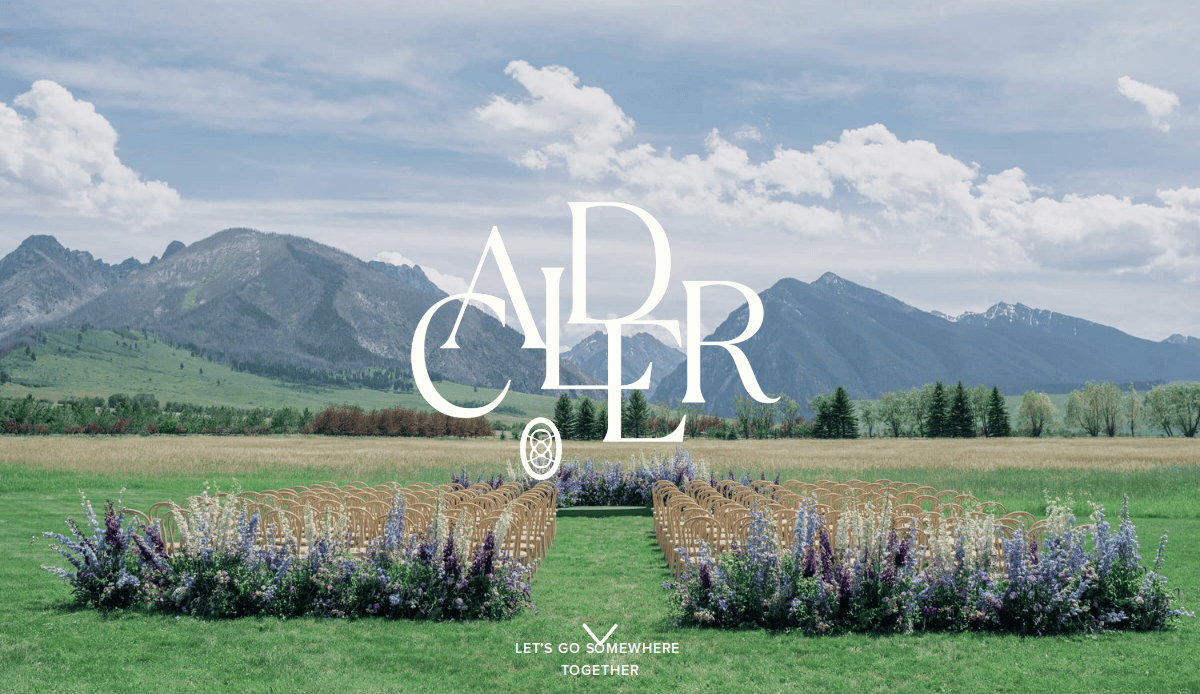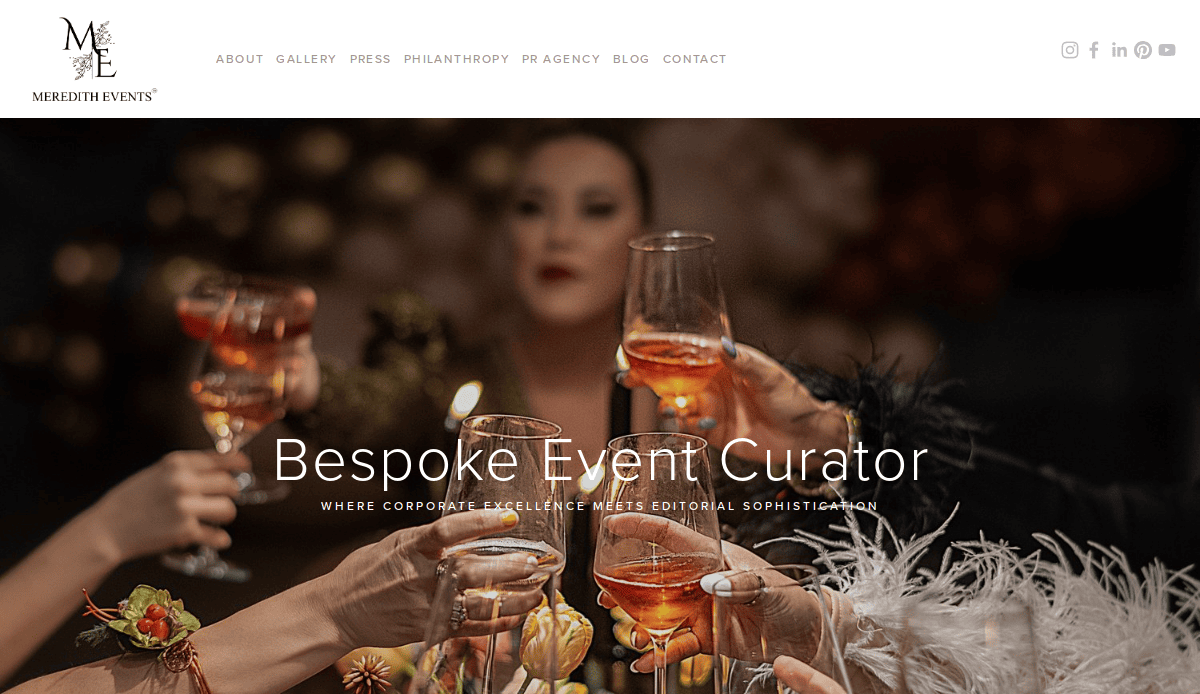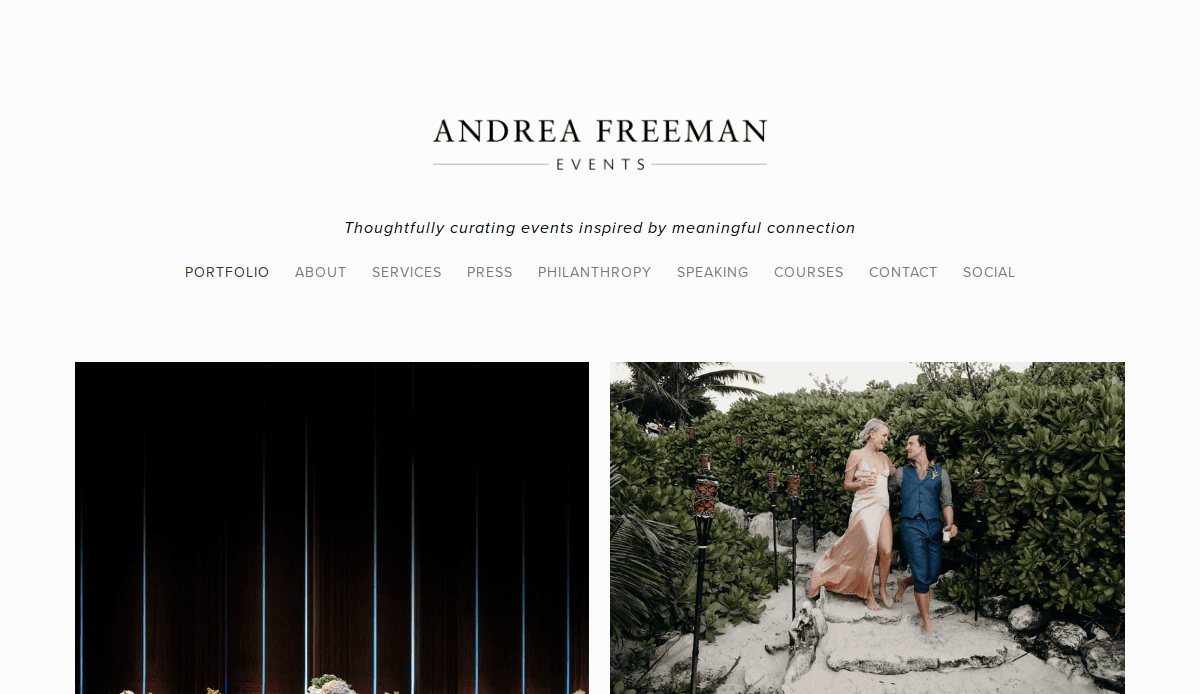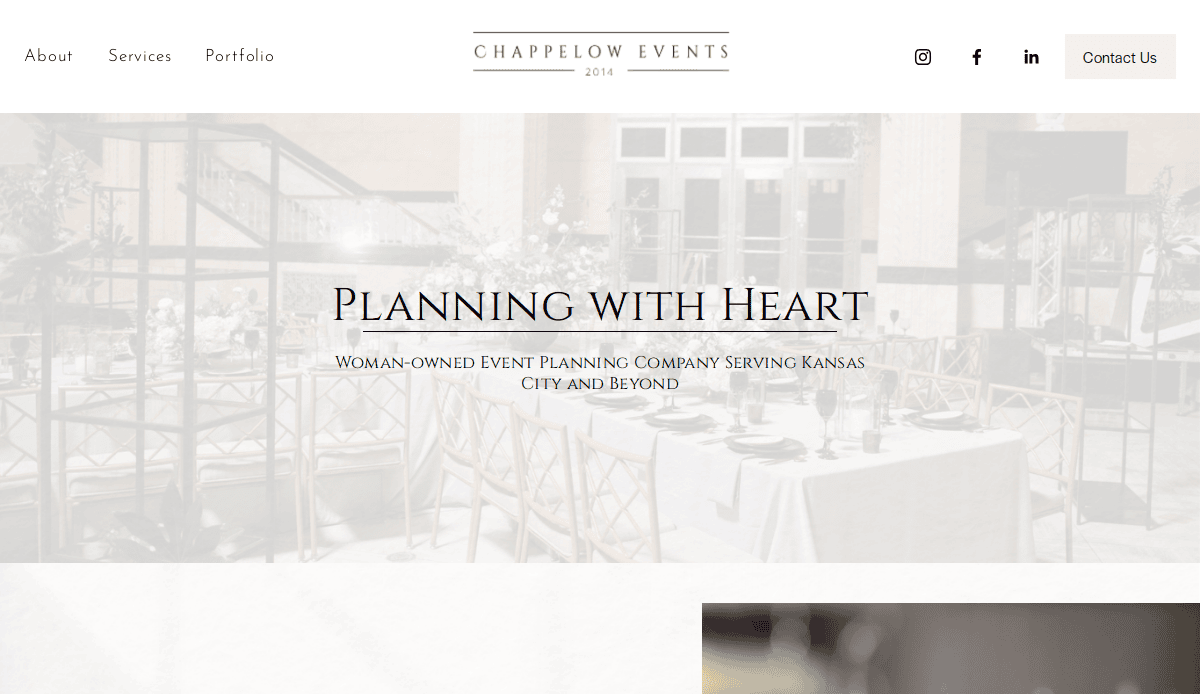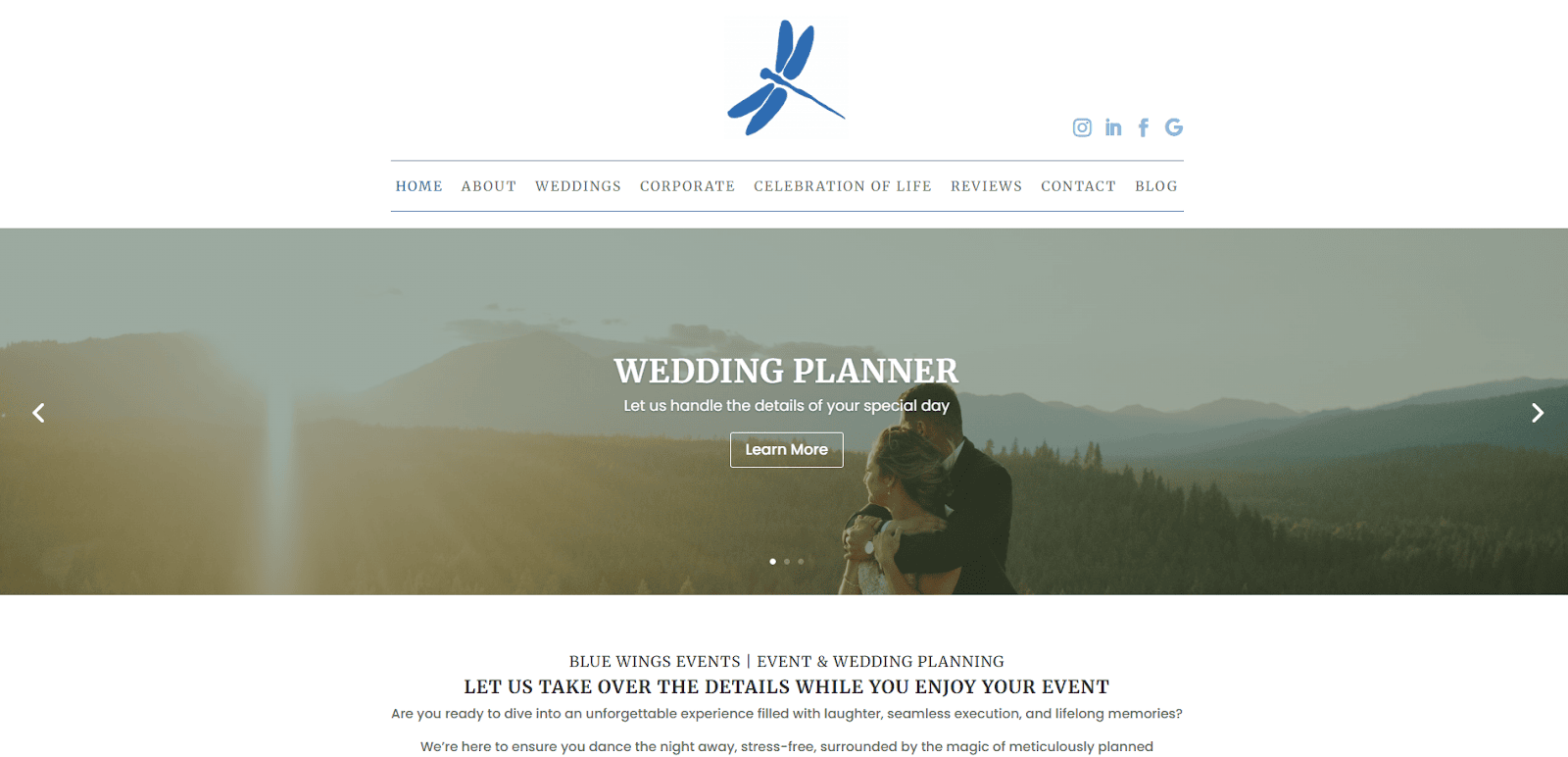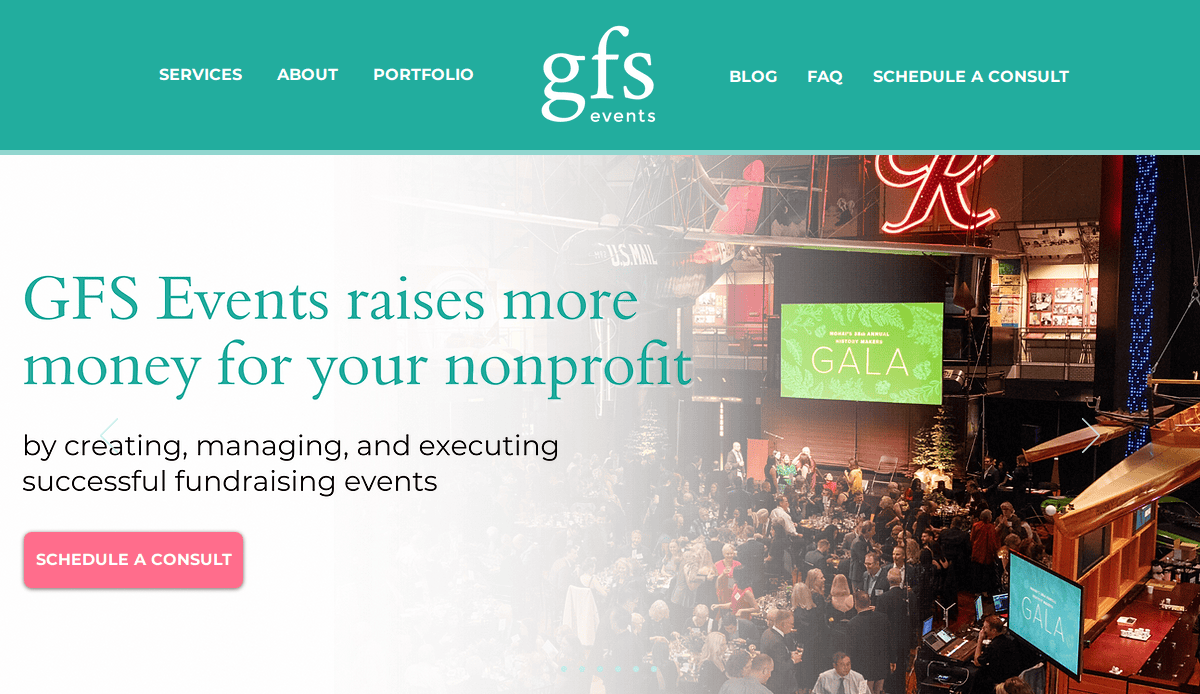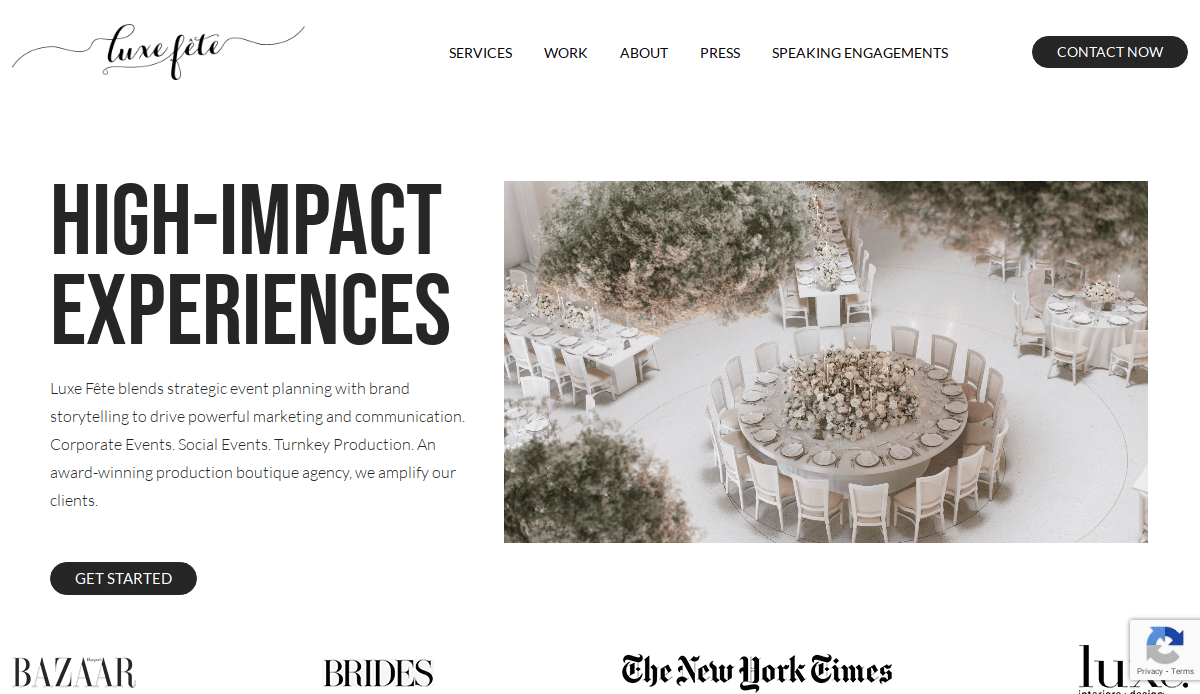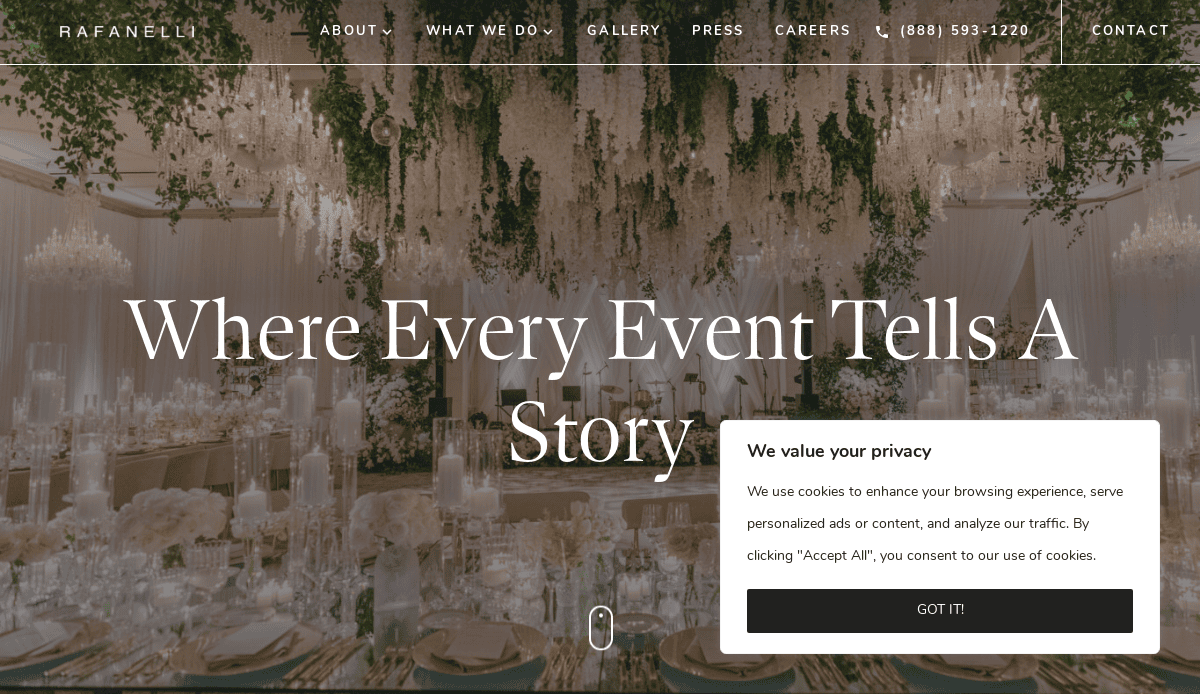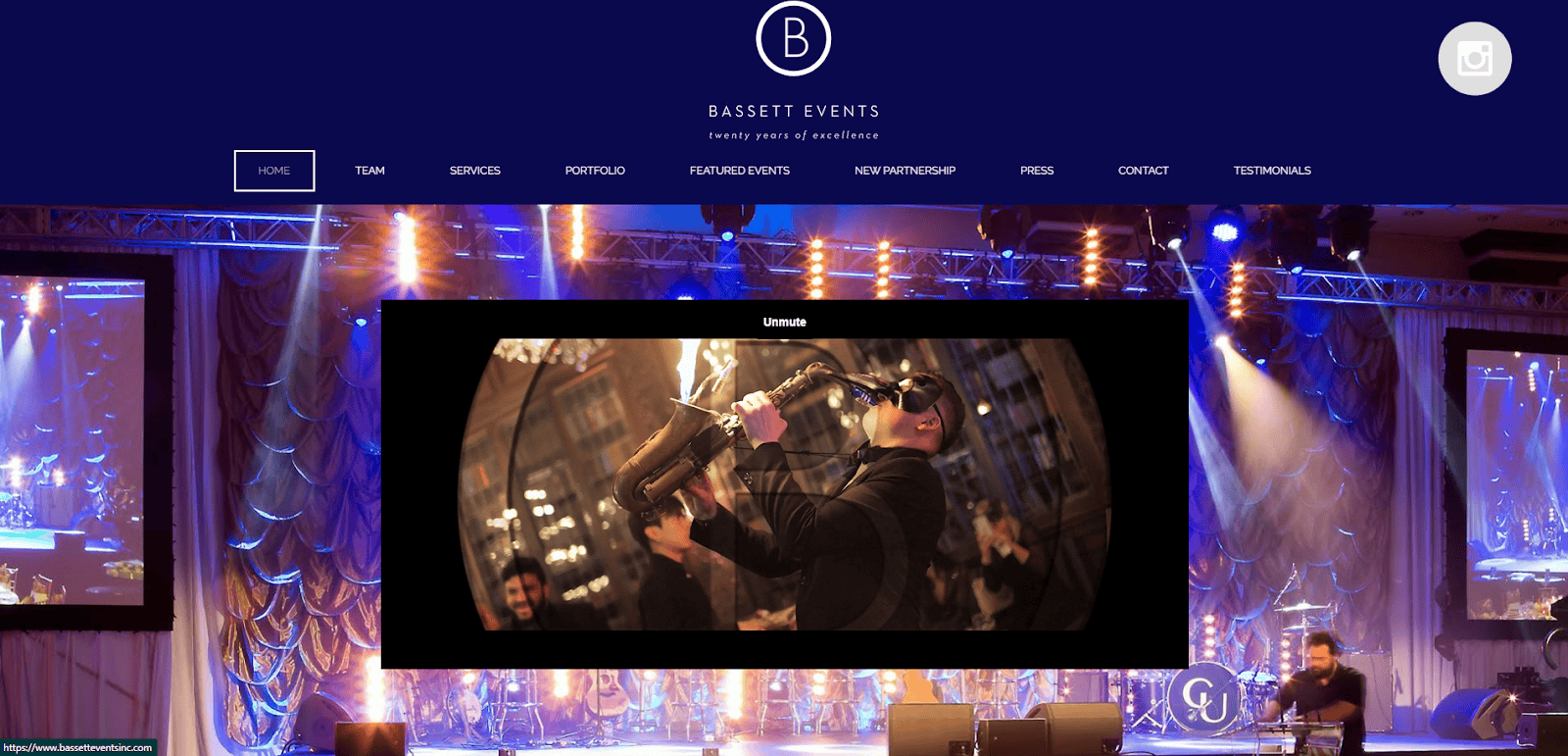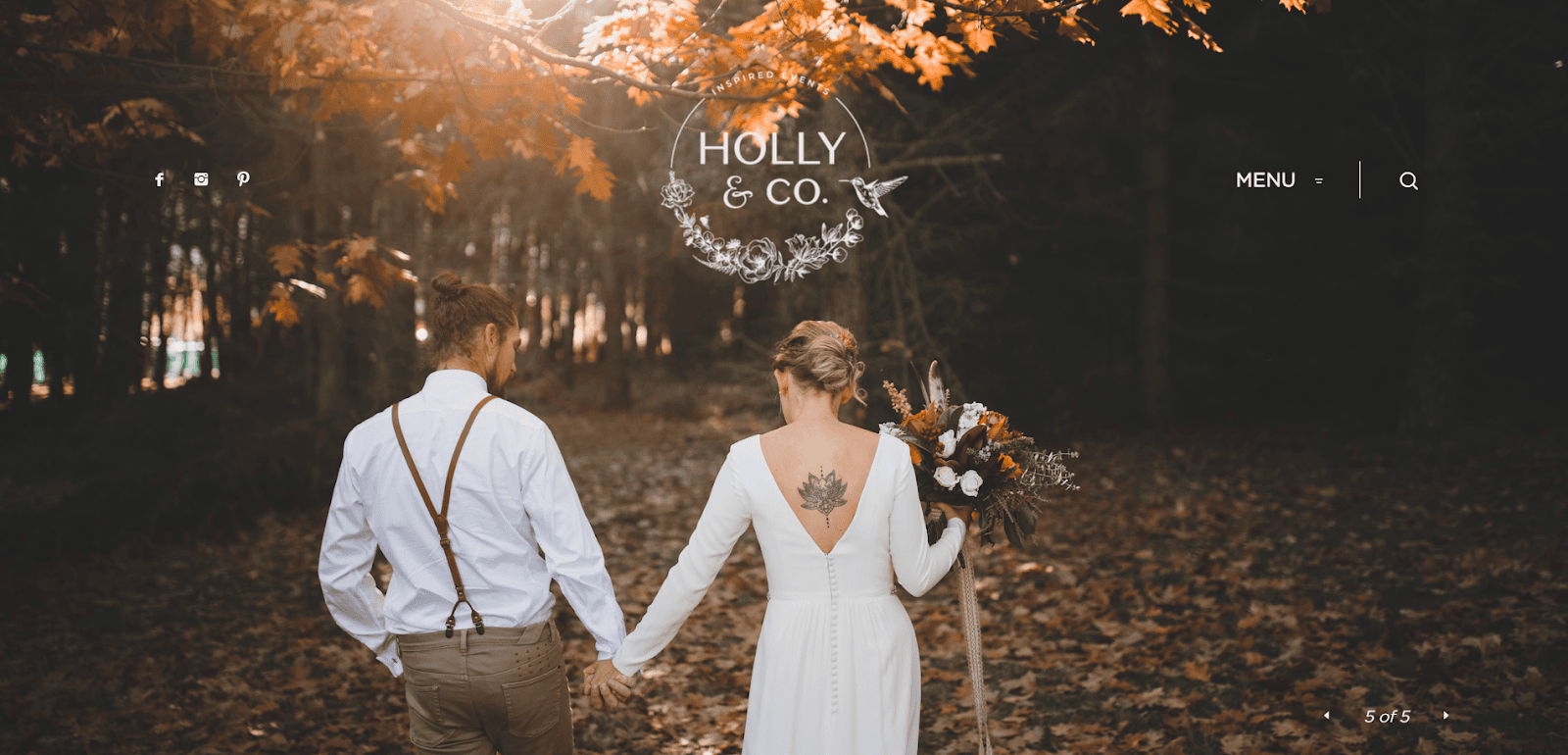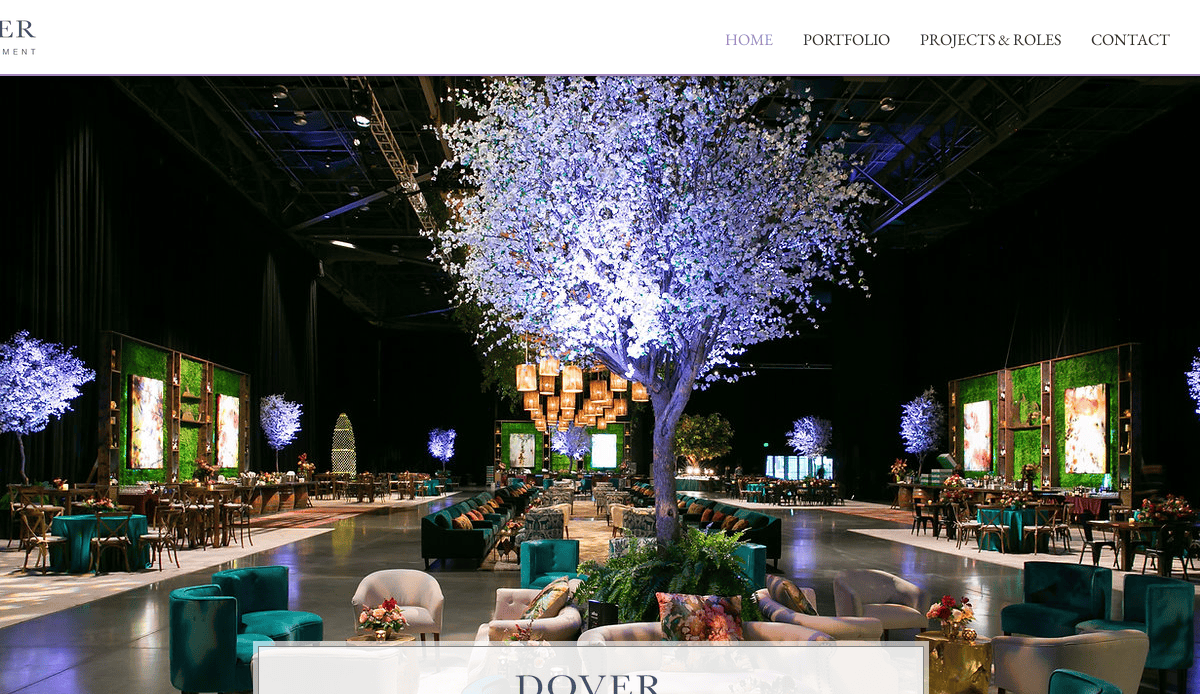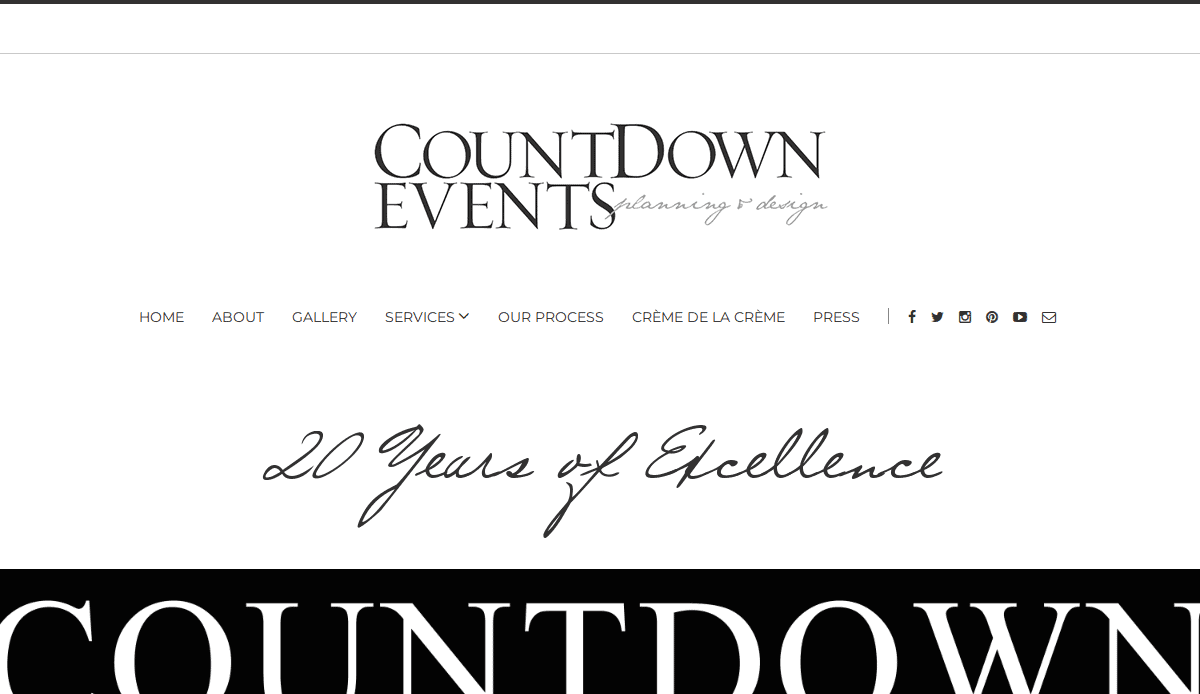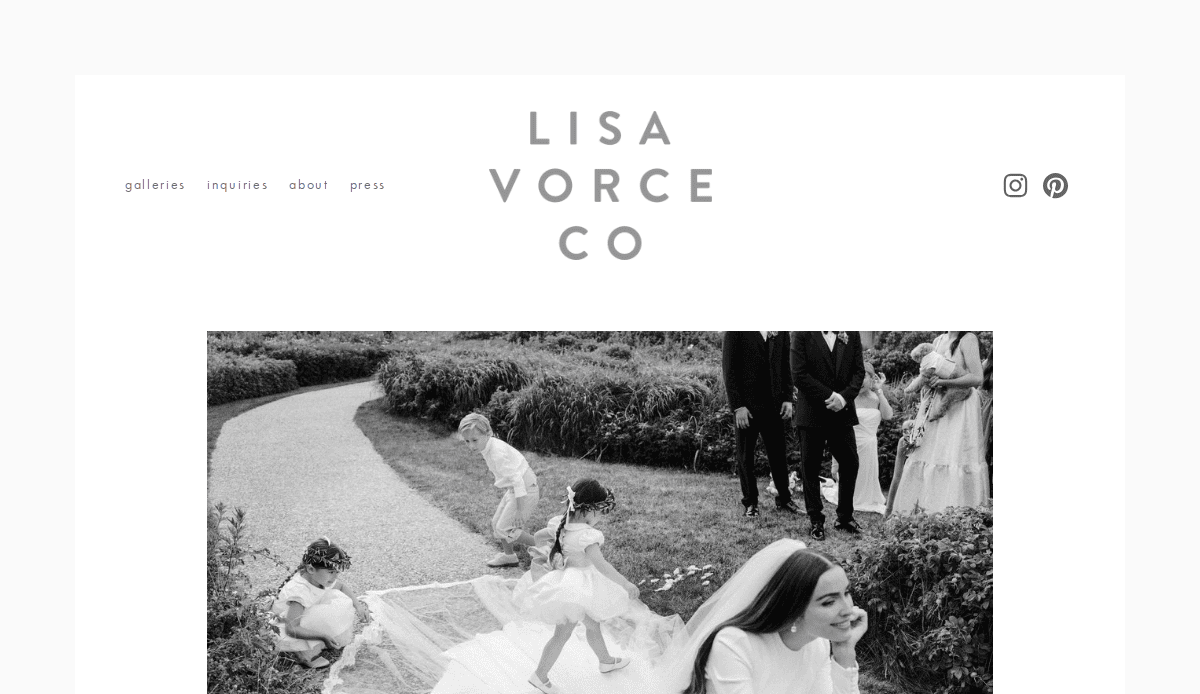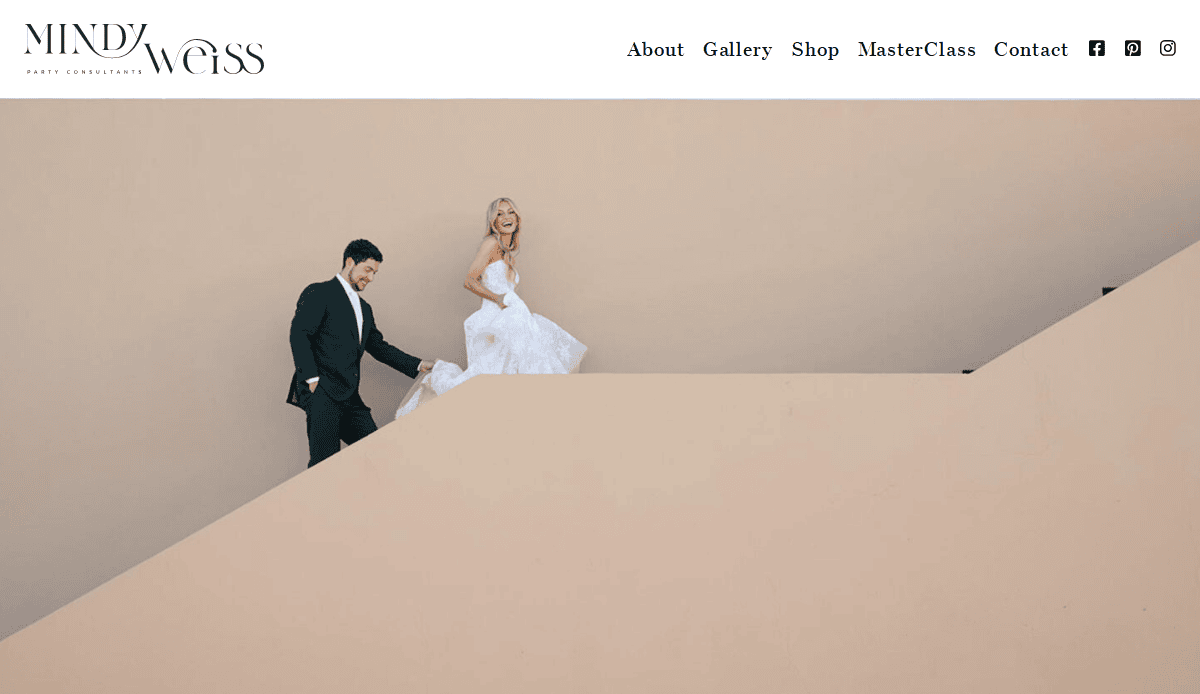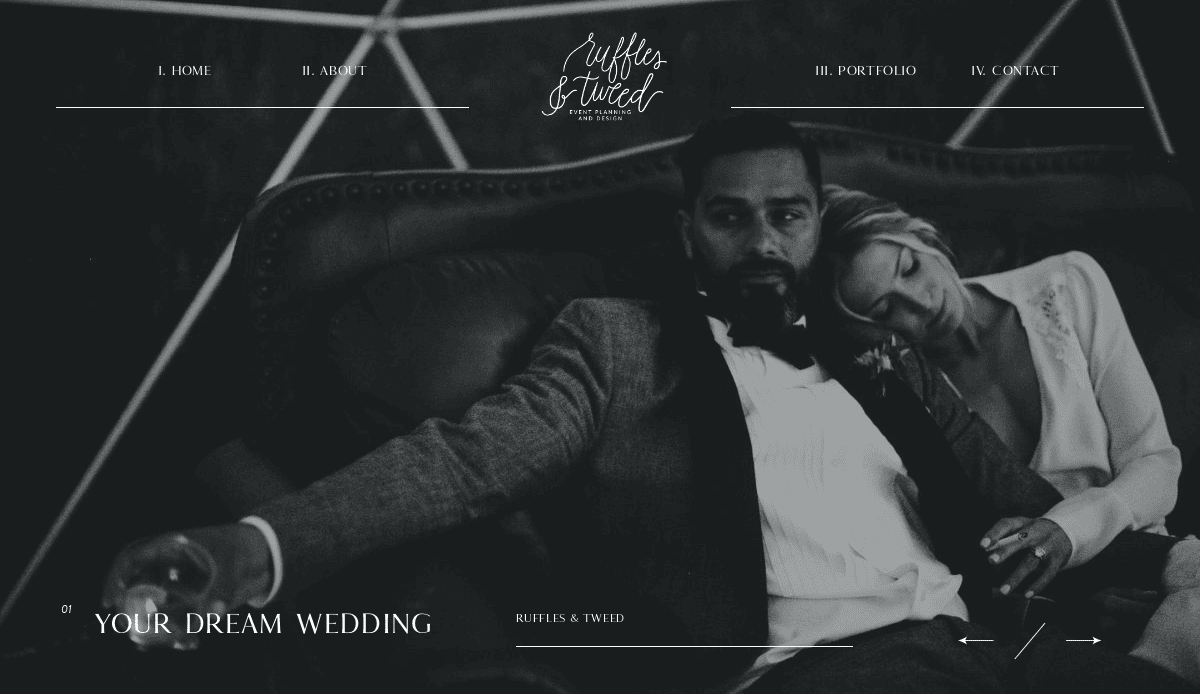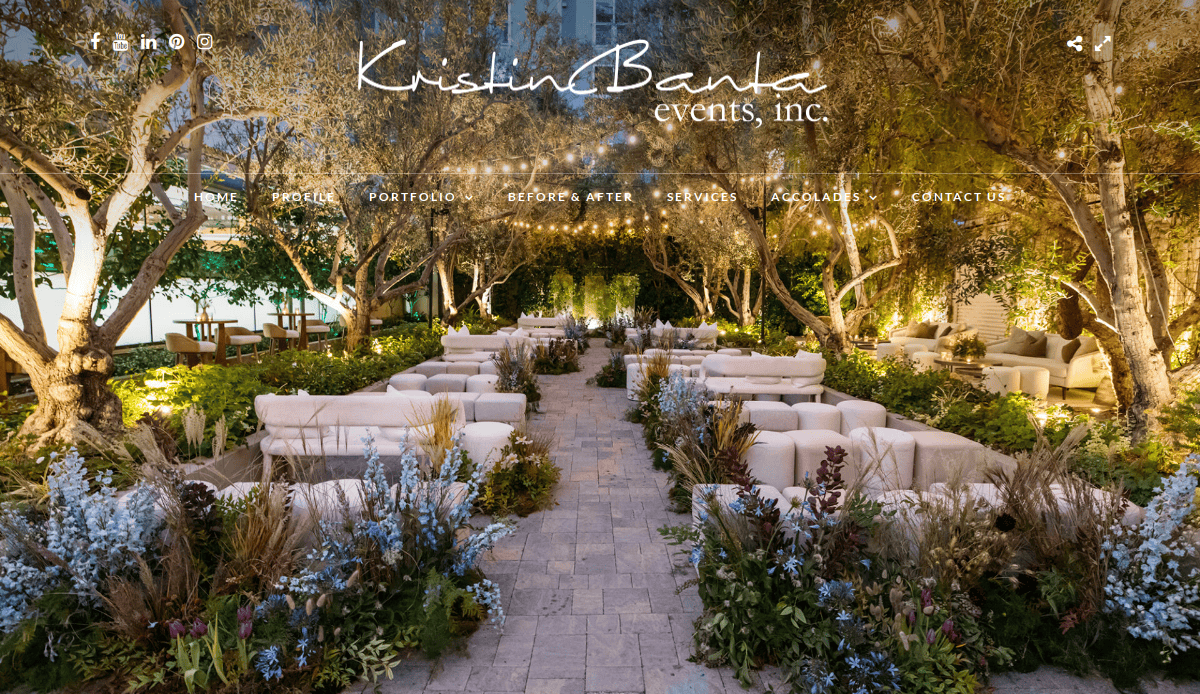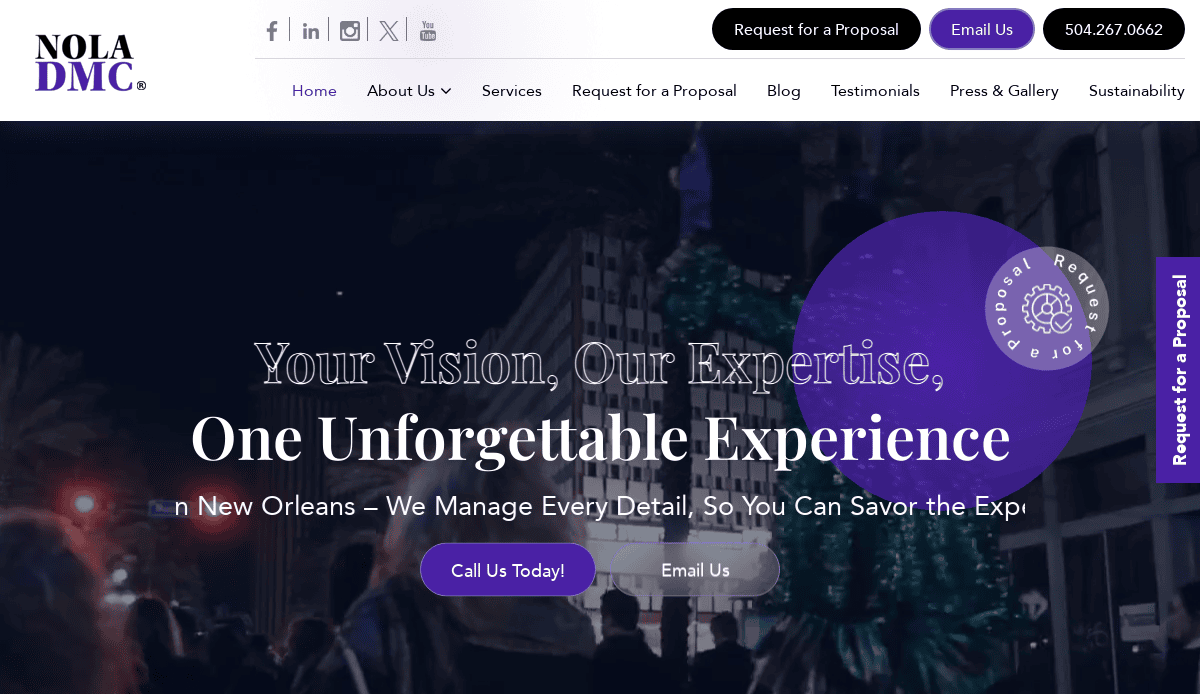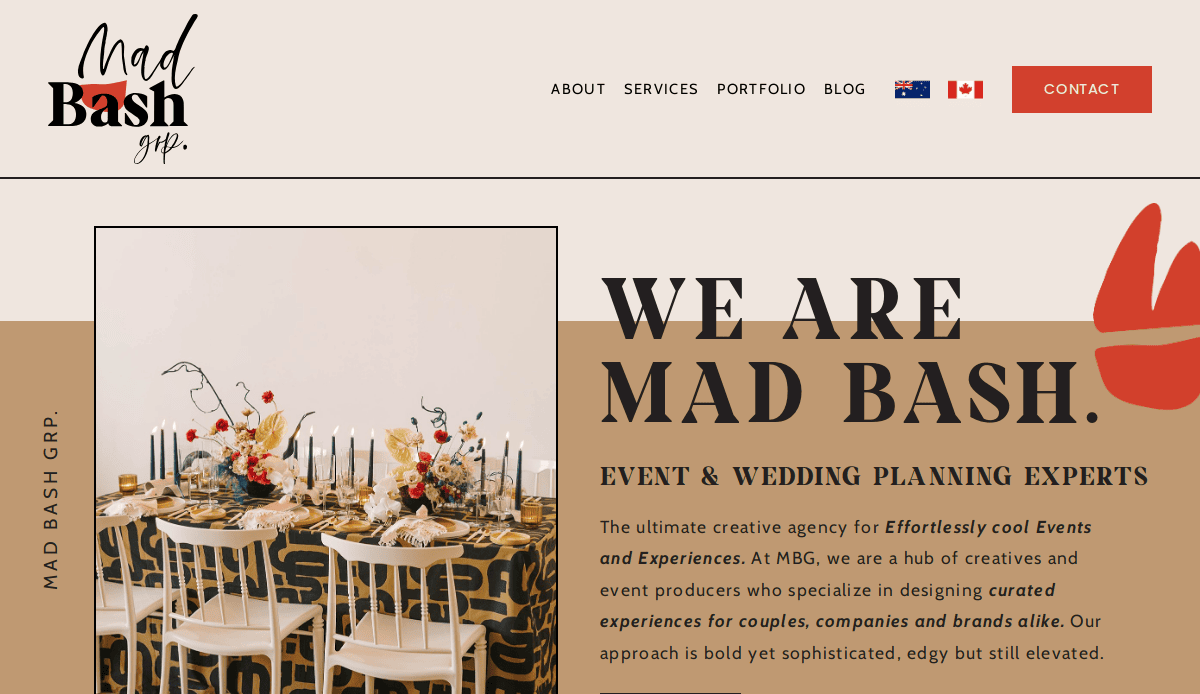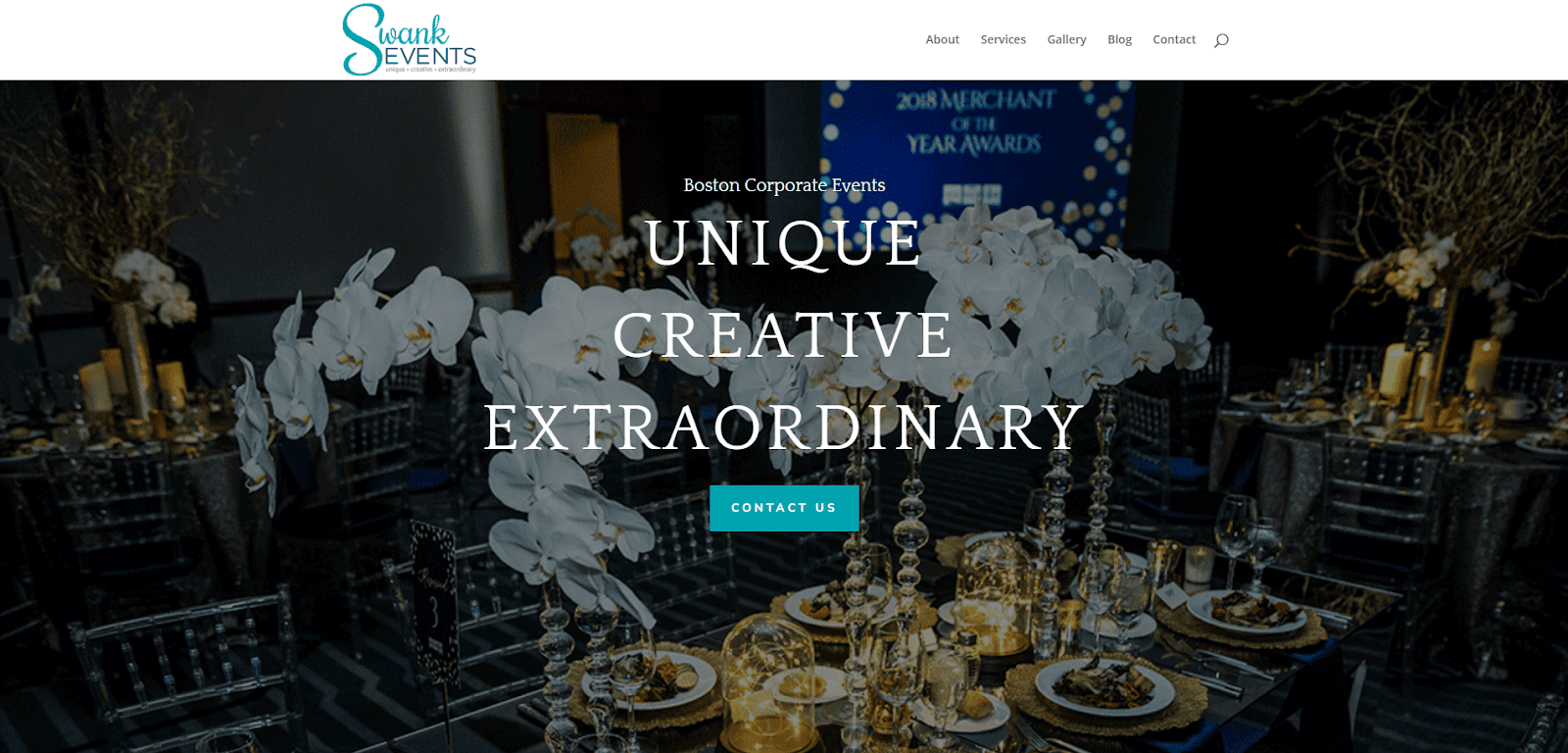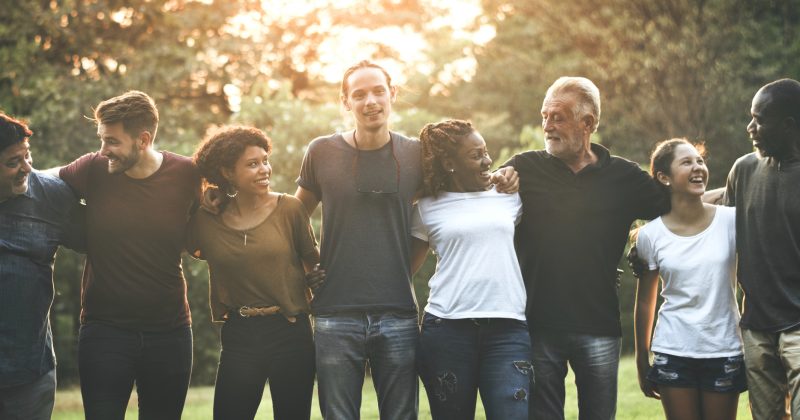Just looking for our Best Event Planner Website examples list?
Creating an effective website for event planning involves more than just aesthetics; it requires strategic planning to ensure functionality, user engagement, and conversion optimization. Here are the essential elements to consider:
- Prioritize User Experience (UX) and Mobile Responsiveness
Ensure your website is intuitive and easy to navigate. A responsive design that adapts seamlessly to various devices enhances accessibility and user satisfaction. - Implement Clear Calls-to-Action (CTAs)
Guide visitors toward desired actions, such as booking a consultation or viewing your portfolio, with prominent and compelling CTAs on every page. - Showcase a Curated Portfolio
Display high-quality images of past events to demonstrate your expertise and style. A well-organized portfolio builds trust and inspires potential clients. - Optimize for Search Engines (SEO)
Incorporate relevant keywords, meta descriptions, and alt text for images to improve your website’s visibility in search engine results. - Integrate Social Proof
Include testimonials, reviews, and endorsements to establish credibility and reassure prospective clients of your reliability and quality of service. - Streamline the Registration and Booking Process
Simplify forms and consider integrating with scheduling or ticketing platforms to facilitate easy client engagement and reduce drop-offs. - Maintain Consistent Branding
Use a cohesive color scheme, typography, and messaging throughout your website to reinforce brand identity and professionalism. - Utilize Analytics and Tracking Tools
Implement analytics to monitor user behavior, track conversions, and gather insights for continuous improvement of your website’s performance. - Incorporate Interactive Elements
Enhance user engagement with features like interactive schedules, live chats, or virtual tours to provide a dynamic browsing experience. - Ensure Accessibility Compliance
Design your website to be accessible to all users, including those with disabilities, by adhering to Web Content Accessibility Guidelines (WCAG).
By focusing on these key areas, your event planner website can effectively attract and convert visitors, reflecting the quality and professionalism of your services.
The Ultimate Guide to Event Planner Website Design That Converts
Today, a website is your storefront, sales team, and brand ambassador—all rolled into one. For event planners, this is even more crucial. Whether you’re curating unforgettable weddings, executing flawless corporate events, or offering full-scale planning services, your website shows prospective clients exactly what kind of experience they can expect. And let’s be clear: if your website doesn’t instantly inspire trust and professionalism, you’re losing business.
The truth is, brilliant event planning deserves a brilliant online presence. Yet, too many event planner websites fall short—generic templates, poor mobile usability, slow load times, and vague messaging. The result? A disconnect between your services and your first impression.
This guide will walk you through what goes into designing a great event planner website—from visual appeal and UX to lead generation strategies and SEO essentials. Whether you specialize in wedding planning, event management, or large-scale corporate event production, your digital presence should reflect your expertise and drive real results.
If you’re ready to turn your website into a lead-generating machine that matches the energy of a great event, keep reading.
Website Planning & Purpose: The Foundation of Effective Site Design
Every successful event begins with a clear plan, and the same is true for website design. A website, too, is a core marketing tool that drives inquiries, builds trust, and reflects the quality of your services. That’s why planning is the most critical phase of event planner website design.
Start by defining the purpose of your website. Are you aiming to showcase a portfolio of stunning events? Generate leads for your event planning services? Offer online booking or consultations? Without a clearly defined goal, even the most visually striking website will fall short. Your planning phase should center around aligning your goals with your target audience’s needs.
User personas are invaluable during this step. Consider what your prospective clients are searching for—whether it’s wedding planning inspiration, company event expertise, or a streamlined way to connect with you. Your site architecture, content, and design elements should all be crafted with these personas in mind.
Next, outline your core pages. At minimum, an events website should include a homepage, services overview, portfolio/gallery, testimonials, contact form, and an about page that conveys credibility. Prioritize mobile responsiveness, since many clients will find your business via smartphone.
At our top-tier digital marketing agency, we recommend grounding your planning with proven web design strategies. Our blog post on the Core Principles of Web Design is a great starting point for understanding how to balance aesthetics, functionality, and usability.
By investing time in the planning phase, event planners can ensure their websites aren’t just pretty—they’re purposeful, persuasive, and primed for growth.
Design Principles That Drive Results
In this industry, first impressions are everything, and your website is often the first impression a potential client gets. A well-designed website can instantly communicate professionalism, creativity, and reliability. On the other hand, a poorly designed one may leave users unsure about the quality of your services, no matter how brilliant your past events have been. This is where strong design principles come into play.
The first principle is visual hierarchy. Visitors should be guided naturally through your website content, with the most important information—like your services and contact options—receiving the most attention. Use contrasting font sizes, consistent color palettes, and strategic spacing to highlight key areas without overwhelming the visitor.
Next is consistency. Your brand colors, fonts, and tone of voice should align with the type of events you specialize in—whether that’s elegant wedding planning, high-end event production, or creative party coordination. This consistency builds trust and recognition while giving your audience a clear sense of your brand personality.
Simplicity in design is also critical. Event planner websites should avoid clutter, which can confuse or distract users. Clean layouts, easy navigation, and a focused call-to-action make it easier for users to engage. A clear menu structure, minimalistic page design, and limited use of pop-ups or animations help maintain professionalism and user comfort.
Another essential principle is responsiveness. Your website should adapt flawlessly across devices—mobile, tablet, and desktop—because many clients will be visiting on the go. A responsive design ensures your imagery, forms, and content remain easy to view and interact with regardless of screen size.
Finally, every design decision should be tied back to usability. The goal is to remove barriers between the user and the information or action they seek, whether that’s filling out a consultation request or viewing a gallery of past events.
If you’re just starting out or looking to improve your current site, our step-by-step guide to the web design process offers a deeper look at how to translate these principles into a polished and strategic online presence.
Following these design fundamentals can turn a basic website into a high-performing digital tool that reflects your expertise and attracts your ideal clients.
Content & Navigation: Structuring for Clarity and Conversion
For professional businesses, content and navigation play a pivotal role in how users engage with your website. Your goal isn’t just to look good—it’s to communicate your services, build trust, and guide visitors toward taking action. That begins with creating purposeful content and structuring intuitive navigation.
Start with clear, client-focused messaging. Each page should answer the question: “What’s in it for me?” Showcase your services with benefit-driven language. Instead of just listing what you offer, explain how you simplify wedding planning, deliver seamless corporate events, or create memorable experiences for your clients. Support these claims with real outcomes, like client testimonials or measurable results.
Your homepage should serve as a snapshot of your brand. It should quickly convey who you are, what you do, and why a visitor should trust you. Use concise headlines, engaging visuals, and strong calls-to-action that lead to key interior pages.
The About page is often overlooked, but crucial. Prospective clients want to know who they’ll be working with. Share your background, experience, and unique approach to planning events. Use this space to humanize your brand and differentiate from competitors.
Your Portfolio or Gallery page should be highly visual, showcasing the range and quality of your past work. Organize this content by event type so visitors can easily find examples that match their needs.
When it comes to Services pages, break them out into categories if you offer multiple specialties. A general overview is helpful, but detailed service pages optimized for keywords like “event management” or “wedding planning” can significantly improve your SEO and help visitors find exactly what they’re looking for.
For navigation, keep it simple and user-first. Use clear labels like Home, About, Services, Portfolio, Blog, and Contact. Avoid dropdown menus with too many layers. If your navigation overwhelms users, they’ll leave. Consider using sticky headers so your main menu is always accessible, especially on mobile devices.
Calls-to-action should be embedded throughout the site, not just on the Contact page. Include them on your homepage, at the end of blog posts, and on your service pages to encourage inquiries, consultations, or bookings.
By organizing content around your audience’s needs and ensuring seamless navigation, your website can guide users smoothly from first impression to conversion. When done right, every click brings them one step closer to choosing you as their planner.
Visual Elements: Creating a Memorable and Trustworthy First Impression
In this industry, visuals aren’t just decoration—they’re proof. Prospective clients want to see your work, your style, and your attention to detail before they ever pick up the phone or fill out a contact form. That’s why the visual elements of your website must be more than beautiful—they must be strategic.
The most important visual asset on any website is high-quality photography. These images should highlight your past events in a way that reflects your brand and your client experience. Show variety—feature weddings, galas, or other specialties that align with your service offerings. Use full-width image galleries, subtle animations, or hover effects to create an immersive experience that allows visitors to explore your work without distraction.
Equally important is the use of consistent color schemes and typography. Choose a palette that reflects your brand identity. Soft tones might communicate elegance and romance, ideal for wedding planning, while bolder colors may suit an energetic corporate event planner. Typography should be easy to read but still reflective of your personality. These design choices reinforce your brand’s professionalism and give visitors a sense of what it’s like to work with you.
Icons and graphic elements can support user navigation and comprehension. Use them sparingly to highlight key services, showcase event types, or support your calls-to-action. Just make sure they don’t overshadow your primary visuals—your event photos should always take center stage.
Video is another powerful visual tool. A well-produced brand video or event recap can bring your work to life, show your personality, and build a sense of trust that static images can’t always achieve. Place video content strategically—on your homepage or about page—to deepen engagement without slowing down your site.
If you’re looking for inspiration, our curated list of the best wedding planner websites showcases how top planners leverage visuals to elevate their brand and convert visitors into leads. The common thread? Clean layouts, intentional photography, and visuals that guide users, not distract them.
Ultimately, every visual element on your website should serve a purpose: to inspire trust, showcase your talent, and create a seamless experience that mirrors the care you bring to every event you plan. When visuals are done right, your website becomes your most persuasive salesperson.
Ongoing WordPress Maintenance: Protecting Your Website Investment
For every professional, a website isn’t a one-time project—it’s a living asset that needs continuous care. You spend countless hours perfecting the details of your events, and your website should reflect that same level of precision. That’s why ongoing WordPress maintenance is non-negotiable.
At a minimum, your site must remain secure. WordPress websites require regular updates to themes, plugins, and core files to prevent vulnerabilities. Failing to update even a single plugin can expose your site to hacking attempts or functionality breakdowns. For an event planner, a compromised website could mean losing inquiries or damaging your professional reputation overnight.
Speed and performance also depend on routine upkeep. A slow-loading website frustrates users and pushes them toward competitors. With regular maintenance, you can clean up database bloat, monitor site speed, and ensure media files are optimized for fast loading across all devices.
Backups are another essential part of the equation. Every time your website is updated, changed, or edited, there should be a fresh backup in place. If something goes wrong—a glitch in a plugin or a server error—you need a quick way to restore your site without interrupting business. For planners juggling multiple events, downtime is not an option.
Maintenance also supports SEO and compliance. Broken links, outdated plugins, or unoptimized code can negatively impact your search engine rankings. In an industry where clients are searching online for services like large event planning or wedding coordination, your visibility depends on your site running at peak performance.
Regular site health audits and analytics tracking help you identify how users are interacting with your content, what’s converting, and what’s not. This data allows you to fine-tune your messaging, update galleries with new events, and keep your portfolio fresh and aligned with your current offerings.
In short, ongoing maintenance keeps your WordPress site as polished and reliable as the events you plan. It safeguards your digital presence, supports your marketing efforts, and ensures that every visitor gets the seamless experience they expect from a professional planner.
Best Event Planner Website Examples
Here are 20 industry examples, including five designed by our agency. Each example showcases unique design elements and features that make them stand out in the industry.
1. Calder Clark
Location: Charleston, SC
Key Takeaways:
- Elegant, refined design with a muted color palette and high-quality images.
- Clean layout and compelling copy highlight attention to detail and bespoke services.
- Engaging testimonials and a visually appealing portfolio demonstrate expertise.
2. Meredith Events
Location: Little Rock, AR
Key Takeaways:
- Elegant and sophisticated design with a striking hero image.
- Clean layout and high-quality visuals set a luxurious tone.
- User-friendly design with seamless navigation and strategic calls to action.
3. Andrea Freeman Events
Location: New York, NY
Key Takeaways:
- Clean, elegant design with vibrant photography showcasing beautiful events.
- Minimalist layout with a focus on high-quality images for a visually engaging experience.
- Engaging copy and heartfelt testimonials highlight commitment to curating meaningful events.
4. Fox Events
Location: Charleston, SC
Key Takeaways:
- Dynamic hero-section slider showcasing different event types.
- Split-screen gallery layout helps visitors identify specific event needs.
- Strategic white space enhances visual impact and user experience.
5. Chappelow Events
Location: Kansas City, MO
Key Takeaways:
- Minimalist elegance with a clean, uncluttered design.
- The fixed navigation menu remains accessible throughout scrolling.
- Thoughtful segmentation of portfolio sections for weddings and corporate events.
6. Blue Wings Events
Location: Seattle, WA
Key Takeaways:
- Classic approach with bold logo placement and clear brand identity.
- Masterful use of contrasting color schemes to highlight calls-to-action.
- Top-down layout featuring bold logo placement and clear brand identity.
7. GFS Events
Location: Seattle, WA
Key Takeaways:
- Mission-focused design with embedded video testimonials.
- Clean layout and compelling copy highlight attention to detail and bespoke services.
- Engaging testimonials and a visually appealing portfolio demonstrate expertise.
8. Luxe Fête
Location: Miami, FL
Key Takeaways:
- Elegant design showcasing high-quality images and refined color palette.
- Intuitive navigation and responsive layout for a smooth experience on any device.
- Compelling copy, glowing client testimonials, and a breathtaking portfolio.
9. Rafanelli Events
Location: Boston, MA
Key Takeaways:
- Sophisticated event planner website design with stunning imagery.
- Sleek color scheme and modern typography for a contemporary look.
- Engaging copy, impressive client testimonials, and dazzling portfolio.
10. Bassett Events
Location: Toronto, ON
Key Takeaways:
- Dynamic video background showcasing stunning events.
- Sleek dark blue color scheme and clear navigation.
- Engaging testimonials and a rich portfolio highlight expertise.
11. Holly & Co.
Location: New Zealand
Key Takeaways:
- Beautiful, serene design with heartwarming images and elegant typography.
- Clean and intuitive layout for easy navigation.
- Engaging copy emphasizing passion and dedication to creating stunning events.
12. Dover Entertainment
Location: Los Angeles, CA
Key Takeaways:
- The striking image of a live performance sets a vibrant tone.
- Sleek, modern look with high-quality visuals and clean layout.
- Engaging copy highlighting expertise in event design, production, and logistics.
13. Countdown Events
Location: Vancouver, BC
Key Takeaways:
- Sophisticated and timeless design with a monochromatic color scheme.
- Homepage highlights 20 years of excellence, building trust and credibility.
- Stunning black-and-white images of corporate and special events.
14. Lisa Vorce Co.
Location: Los Angeles, CA
Key Takeaways:
- Minimalist and elegant design with a stunning video of a beautifully crafted wedding dress.
- Clean layout and soft color palette enhance user experience.
- Engaging copy emphasizes expertise in planning extraordinary events.
15. Mindy Weiss
Location: Beverly Hills, CA
Key Takeaways:
- Minimalist design adorned with playful typography and soft hues.
- The striking hero section introduces profound expertise in event planning.
- Streamlined layout ensures effortless navigation.
16. Ruffles & Tweed
Location: New York, NY
Key Takeaways:
- Elegant design with stunning floral imagery and sophisticated layout.
- Minimalist design emphasizes bespoke event planning and upscale wedding services.
- Engaging copy highlights passion for creating unique events.
17. Kristin Banta Events
Location: Los Angeles, CA
Key Takeaways:
- Well-designed layout and straightforward interface.
- Clean, modern aesthetic with high-quality visuals.
- Engaging copy highlighting expertise in event planning.
18. Nola DMC
Location: New Orleans, LA
Key Takeaways:
- State-of-the-art design website with high-quality video clips on the homepage.
- Enticing background is welcoming and entertaining.
- Clean layout and intuitive navigation.
19. Mad Bash Group
Location: Detroit, MI
Key Takeaways:
- Innovative design that feels fresh and unique.
- User-friendly interface makes navigation a breeze.
- Impactful imagery conveys the significance of their work.
20. Swank Events Boston
Location: Boston, MA
Key Takeaways:
- Sophisticated aesthetics make you feel the elegance and style of their event offerings.
- Clean layout and intuitive navigation.
- Engaging copy highlighting expertise in event planning.
These websites exemplify how thoughtful design, clear messaging, and user-friendly navigation can create an effective online presence for event planners. Whether you’re seeking inspiration or looking to revamp your own site, these examples offer valuable insights into successful event planner website design.
Ready to Elevate Your Event Planning Website?
Your website isn’t just a portfolio—it’s your most powerful sales tool. Whether you specialize in weddings, corporate gatherings, or full-service event planning and design, your digital presence must reflect your expertise, style, and professionalism. A great website shows potential clients exactly what you bring to the table—your process, your personality, and your promise to deliver unforgettable experiences.
If you’re inspired by the examples of event planner website excellence above and ready to stand out with a top-tier website of your own, our design experts are here to help. We create stunning, user-friendly designs built specifically for the needs of professional event planners and full-service event companies. From concept to conversion, we’re your partner in turning inspiration into a website that delivers real business results.
Schedule a free consultation today, and let’s build the kind of website that sets your company apart.
Common Questions About Event Planner Site Design
What should an event planner’s website include to attract clients?
An event planner’s website should showcase their expertise with a well-organized event portfolio, testimonials, contact information, and a clear summary of their services. Use a minimalist design for readability, highlight your planning and design services, and ensure that every page supports conversion. For design inspiration, view these stunning examples of event planner websites that showcase how the best in the industry structure content and visuals.
How do I make my event’s website stand out?
To stand out, think of your website as an experience, not just a brochure. Use high-impact visuals like a background image from a signature event or a virtual event highlight reel. Pair that with a unique design and clear value proposition. Great design and production elevate your brand above a crowded market and communicate professionalism and creativity at first glance.
What are the best features to include in a site for event planning’s design?
Some of the most effective website features include a categorized event portfolio, integrated scheduling or contact forms, social proof like reviews, and blog content that shares planning tips or showcases event experiences that resonate. A personal website feel can also help smaller firms or independent planners connect emotionally with visitors.
Are there specific design styles that work best for different types of event planning?
Yes. For a DC event planner targeting corporate clients, a sleek and modern aesthetic works well. Outdoor event specialists might benefit from a nature-inspired color palette and large landscape photography. Wedding planners often lean into romantic, soft-toned themes. A design company specializing in distinctive visuals should match its online presence with the same level of creativity and polish.
What kind of businesses benefit most from a custom website?
Any agency, from those focused on virtual event logistics to full-service event planning and design companies, benefits from a custom site. Whether you run a small planning and design company specializing in intimate gatherings or are among the leading event planners in the world, your site should reflect your caliber and service scope.
How important is mobile optimization for an event planner’s website?
Mobile responsiveness is critical. Many clients find event planners through their phones, especially during the initial stages of researching. A website that welcomes visitors on any device ensures you don’t miss out on potential inquiries due to poor mobile usability.
Can I use my website to grow SEO rankings?
Absolutely. Optimizing your website with location-based keywords (e.g., “event agency in Chicago”), showcasing your event portfolio in well-structured galleries, and publishing regular blog posts can all improve search engine visibility. If you’re unsure where to begin, our guide on core web design principles is a helpful resource for creating a website that does a great job at both engagement and rankings.
How often should I update my website?
Your site should be updated regularly with new events, client reviews, and content that reflects seasonal trends or upcoming promotions. Keeping your event planning tools and services current ensures your site stays relevant and competitive. Updates also help reinforce your expertise and keep returning visitors engaged.
Is a blog helpful for an industry-specific website?
Yes. A blog is an excellent tool to demonstrate your planning and design expertise, share event planning process insights, and highlight recent projects. It also boosts SEO and gives your audience a reason to revisit your site. Share posts about behind-the-scenes planning for a full-service event, tips for executing a successful outdoor event, or insights from attending a recent event planner expo.

